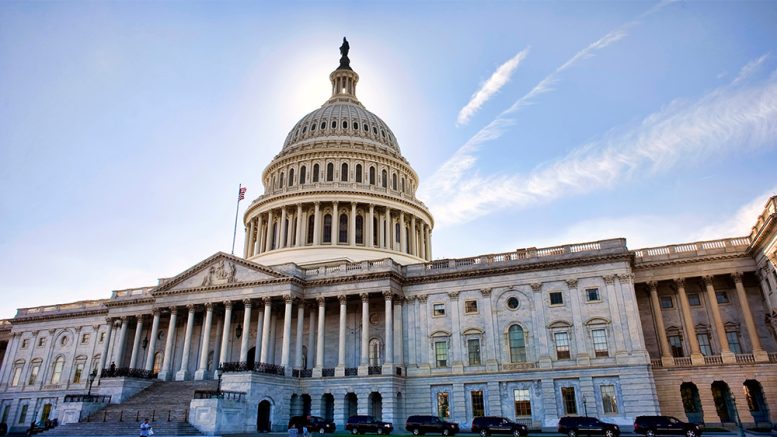
Young
U.S. Senators Todd Young (R-Ind.) and Mark Kelly (D-Ariz.) re-introduced on Wednesday the Shipbuilding and Harbor Infrastructure for Prosperity and Security (SHIPS) for America Act, comprehensive legislation to revitalize the United States shipbuilding and commercial maritime industries.
There are currently 80 U.S.-flagged vessels in international commerce while China has 5,500. The SHIPS for America Act aims to close this gap and boost the U.S. Merchant Marine by establishing national oversight and consistent funding for U.S. maritime policy, making U.S.-flagged vessels commercially competitive in international commerce by cutting red tape, rebuilding the U.S. shipyard industrial base, and expanding and strengthening mariner and shipyard worker recruitment, training, and retention.
Young and Kelly originally introduced the SHIPS for America Act in December 2024. Since the introduction, the urgency to boost American shipbuilding has emerged as a priority of bipartisan consensus this year, particularly after the Office of the U.S. Trade Representative revealed the findings of its investigation into China’s shipbuilding dominance and President Trump’s signing of a shipbuilding executive order.
“America has been a maritime nation since our founding, and seapower was a significant contributor to our rise to being the most powerful nation on earth,” said Sen. Young, a U.S. Naval Academy graduate. “Unfortunately, the bottom line now is America needs more ships. Shipbuilding is a national security priority and a stopgap against foreign threats and coercion. Our bill will revitalize the U.S. maritime industry, grow our shipbuilding capacity, rebuild America’s shipyard industrial base, and support nationwide workforce development in this industry. This legislation is critical to our warfighting capabilities and keeping pace with China.”
U.S. Representatives Trent Kelly (R-Miss.-01) and John Garamendi (D-Calif.-8) will introduce companion legislation in the House on Thursday.
More specifically, the SHIPS for America Act would:
- Coordinate U.S. maritime policy by establishing the position of Maritime Security Advisor within the White House, who would lead an interagency Maritime Security Board tasked with making whole-of-government strategic decisions for how to implement a National Maritime Strategy. The bill also establishes a Maritime Security Trust Fund that would reinvest duties and fees paid by the maritime industry into maritime security programs and infrastructure supporting maritime commerce.
- Establish a national goal of expanding the U.S.-flag international fleet by 250 ships in 10 years by creating the Strategic Commercial Fleet Program, which would facilitate the development of a fleet of commercially operated, U.S.-flagged, American crewed, and domestically built merchant vessels that can operate competitively in international commerce.
- Enhance the competitiveness of U.S.-flagged vessels in international commerce by establishing a Rulemaking Committee on Commercial Maritime Regulations and Standards to cut through the U.S. Coast Guard’s bureaucracy and red tape that limits the international competitiveness of U.S.-flagged vessels, modify duties to make cargo on U.S.-flag vessel’s more competitive, requiring that government-funded cargo move aboard U.S.-flag vessels, and requiring a portion of commercial goods imported from China to move aboard U.S.-flag vessels starting in 2030.
- Expand the U.S. shipyard industrial base, for both military and commercial oceangoing vessels, by establishing a 25 percent investment tax credit for shipyard investments, transforming the Title XI Federal Ship Financing Program into a revolving fund, and establishing a Shipbuilding Financial Incentives program to support innovative approaches to domestic ship building and ship repair.
- Accelerate U.S. leadership in next-generation ship design, manufacturing processes, and ship energy systems by establishing the U.S. Center for Maritime Innovation, and supporting regional hubs for maritime innovation across the country by establishing a Maritime Prosperity Zone program.
- Make historic investments in maritime workforce by supporting a Maritime Workforce Promotion and Recruitment Campaign, allowing mariners to retain their credentials through a newly established Merchant Marine Career Retention Program, investing in long-overdue infrastructure needs for the U.S. Merchant Marine Academy, and supporting State Maritime Academies and Centers for Excellence for Domestic Maritime Workforce Training and Education. The bill also makes long-overdue changes to streamline and modernize the U.S. Coast Guard’s Merchant Mariner Credentialing system.
The legislation will be introduced in two pieces in the Senate, the SHIPS for America Act and the Building SHIPS in America Act. A section by section of the bill can be found here.

